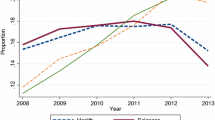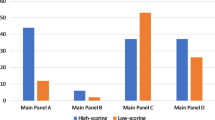Abstract
The overall readability of CHI publications is not known. In addition, little is understood about what lexical or demographic characteristics are unique to award winning papers at CHI and if they are significantly different from non award winning papers. We therefore carry out an exploration and assessment into the readability metrics as well as a meta analysis of 382 full papers and 54 notes from the 2014, 2015, 2016 and 2017 editions at CHI. Our results illustrate that notes did not have any significant trends whatsoever. On the other hand, award winning full papers were shown to have lower readability as compared to non award winning full papers. The type of research contribution played an important role; such that award winning full papers were significantly more likely to have a theoretical contribution as compared to non award winning full papers and full papers that presented an artifact as their contribution were more readable than other full papers. Our demographic analysis of authors indicated that the experience of authors nor their region of affiliation were not associated with the likelihood of their full paper being awarded. The experience of authors did not effect the overall readability of full papers however the region of affiliation did have a significant influence on the overall readability of full papers. In conclusion, we speculate on our obtained results through linkages with prior work in readability analysis.
Similar content being viewed by others
References
Alluqmani, A., & Shamir, L. (2018). Writing styles in different scientific disciplines: A data science approach. Scientometrics, 115(2), 1–15.
Armstrong, J. S. (1989). Readability and prestige in scientific journals. Journal of Information Science, 15, 123–124. https://papers.ssrn.com/sol3/papers.cfm?abstract_id=668145.
Bartneck, C., & Hu, J. (2009) Scientometric analysis of the chi proceedings. In Proceedings of the SIGCHI conference on human factors in computing systems (pp. 699–708). ACM.
Best of CHI 2011 Award Winners. (2011). Best of CHI 2011 award winners. http://www.chi2011.org/program/awards.html. Accessed 15 Feb 2018.
Bird, S., Klein, E., & Loper, E. (2009). Natural language processing with Python: Analyzing text with the natural language toolkit. Sebastopol, CA: O’Reilly Media Inc.
Brischoux, F., & Legagneux, P. (2009). Don’t format manuscripts. The Scientist, 23(7), 24.
Costas, R., Leeuwen, T. N., & Bordons, M. (2012). Referencing patterns of individual researchers: Do top scientists rely on more extensive information sources? Journal of the Association for Information Science and Technology, 63(12), 2433–2450.
Coupé, T. (2013). Peer review versus citations—An analysis of best paper prizes. Research Policy, 42(1), 295–301.
Dolnicar, S., & Chapple, A. (2015). The readability of articles in tourism journals. Annals of Tourism Research, 52, 161–166.
DuBay, W. H. (2004). The principles of readability. Online Submission. https://files.eric.ed.gov/fulltext/ED490073.pdf.
Felt, A. P., Reeder, R. W., Almuhimedi, H., & Consolvo, S. (2014). Experimenting at scale with google chrome’s SSL warning. In Proceedings of the 32nd annual ACM conference on human factors in computing systems (pp. 2667–2670). ACM.
Gazni, A. (2011). Are the abstracts of high impact articles more readable? Investigating the evidence from top research institutions in the world. Journal of Information Science, 37(3), 273–281.
Guerini, M., Pepe, A., & Lepri, B. (2012). Do linguistic style and readability of scientific abstracts affect their virality? In Proceedings of the Sixth International AAAI Conference on Weblogs and Social Media (pp. 475–478).
Hartley, J., & Cabanac, G. (2016). Are two authors better than one? Can writing in pairs affect the readability of academic blogs? Scientometrics, 109(3), 2119–2122.
Hartley, J., Pennebaker, J., & Fox, C. (2003). Abstracts, introductions and discussions: How far do they differ in style? Scientometrics, 57(3), 389–398.
Katan, S., Grierson, M., & Fiebrink, R. (2015). Using interactive machine learning to support interface development through workshops with disabled people. In Proceedings of the 33rd annual ACM conference on human factors in computing systems (pp. 251–254). ACM.
Kitchenham, B. A., Brereton, O. P., Owen, S., Butcher, J., & Jefferies, C. (2008). Length and readability of structured software engineering abstracts. IET software, 2(1), 37–45.
Knauff, M., & Nejasmic, J. (2014). An efficiency comparison of document preparation systems used in academic research and development. PloS One, 9(12), e115,069.
Landay, J. (2009). I give up on CHI/UIST. Blog entry. Retrieved November 10, 2009.
Lee, J., Vicente, K., Cassano, A., & Shearer, A. (2003). Can scientific impact be judged prospectively? A bibliometric test of simonton” s model of creative productivity. Scientometrics, 56(2), 223–232.
Lee, S., & French, N. (2011). The readability of academic papers in the journal of property investment & finance. Journal of Property Investment & Finance, 29(6), 693–704.
Lei, L. (2016). When science meets cluttered writing: adjectives and adverbs in academia revisited. Scientometrics, 107(3), 1361–1372.
Lei, L., & Yan, S. (2016). Readability and citations in information science: Evidence from abstracts and articles of four journals (2003–2012). Scientometrics, 108(3), 1155–1169.
Luo, Y., & Vogel, D. (2014). Crossing-based selection with direct touch input. In Proceedings of the SIGCHI conference on human factors in computing systems (pp. 2627–2636). ACM.
Mick, D. (2005). Inklings: From mind to page in consumer research. In Association of consumer research newsletter (pp. 1–3).
Mittal, H., & Gupta, P. (2011). Fate of award winning papers at annual conference of Indian academy of pediatrics: A 13 years experience. Indian Pediatrics, 48, 818–819. https://www.indianpediatrics.net/oct2011/oct-818-819.htm.
Mubin, O., Al Mahmud, A., & Ahmad, M. (2017). HCI down under: Reflecting on a decade of the OzCHI conference. Scientometrics, 112(1), 367–382.
Nacke, L. E. (2017). How to write and review chi papers. In Proceedings of the 2017 CHI conference extended abstracts on human factors in computing systems (pp. 1228–1231). ACM.
Okulicz-Kozaryn, A. (2013). Cluttered writing: Adjectives and adverbs in academia. Scientometrics, 96(3), 679–681.
Olsen, Jr D. R. (2007). Evaluating user interface systems research. In Proceedings of the 20th annual ACM symposium on user interface software and technology (pp 251–258). ACM.
Plavén-Sigray, P., Matheson, G. J., Schiffler, B. C., & Thompson, W. H. (2017). The readability of scientific texts is decreasing over time. bioRxiv 119370.
pypdf2. (2016). The PdfFileReader class. https://pythonhosted.org/PyPDF2/PdfFileReader.html. Accessed 15 Feb 2018.
Sawyer, A. G., Laran, J., & Xu, J. (2008). The readability of marketing journals: Are award-winning articles better written? Journal of Marketing, 72(1), 108–117.
Wainer, J., Eckmann, M., & Rocha, A. (2015). Peer-selected best papers are they really that good? PloS One, 10(3), e0118,446.
Wobbrock, J. O., & Kientz, J. A. (2016). Research contributions in human–computer interaction. Interactions, 23(3), 38–44.
Young, A. (2016). Reflections on the games & play virtual committee meeting. http://sigchi.tumblr.com/post/143440663545/reflections-on-the-games-play-virtual-committee. Accessed 15 Feb 2018.
Zhang, Y., & Hornof, A. J. (2014). Understanding multitasking through parallelized strategy exploration and individualized cognitive modeling. In Proceedings of the 32nd annual ACM conference on Human factors in computing systems (pp. 3885–3894). ACM.
Zimmerman, J. L. (1989). Improving a manuscript’s readability and likelihood of publication. Issues in Accounting Education, 4(2), 458–466.
Author information
Authors and Affiliations
Corresponding author
Appendix: Python code
Appendix: Python code









Rights and permissions
About this article
Cite this article
Mubin, O., Tejlavwala, D., Arsalan, M. et al. An assessment into the characteristics of award winning papers at CHI. Scientometrics 116, 1181–1201 (2018). https://doi.org/10.1007/s11192-018-2778-7
Received:
Published:
Issue Date:
DOI: https://doi.org/10.1007/s11192-018-2778-7




